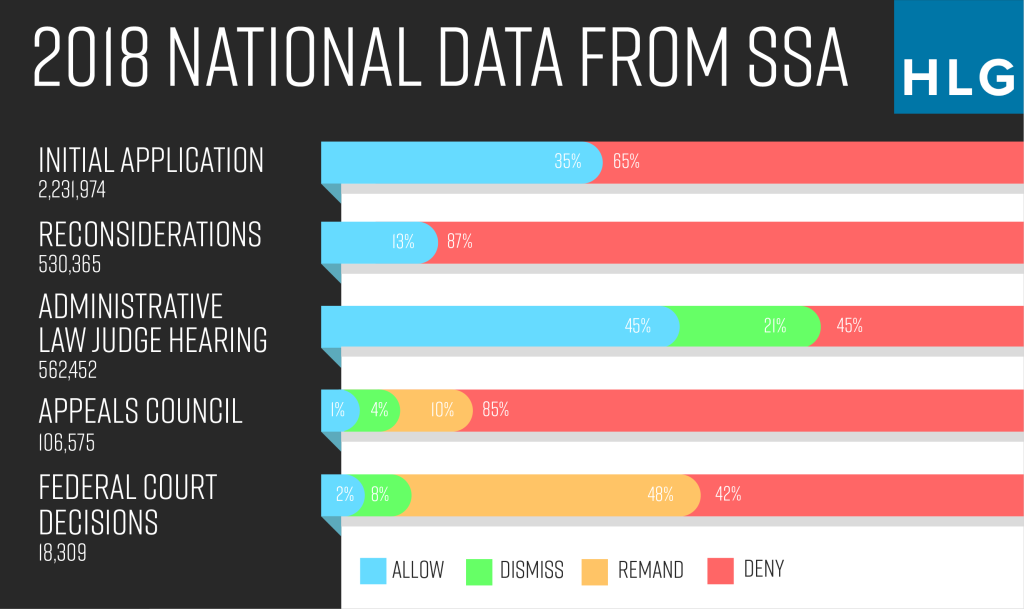How does a Social Security Disability Hearing Work?
Applying for Social Security disability benefits is a multi-step process that can take months or even years if you are initially denied. If you appeal the first denial and are denied a second time, you have the right to a hearing before a judge. The judge has the power to approve or deny your application. […]

September 9, 2019

Applying for Social Security disability benefits is a multi-step process that can take months or even years if you are initially denied.
If you appeal the first denial and are denied a second time, you have the right to a hearing before a judge. The judge has the power to approve or deny your application.
How to Request a Hearing
Filing a request for a hearing has the same requirements as a request for reconsideration. You must submit the request in writing to the Social Security Administration (SSA) within 65 days of the date on your denial letter.
Your disability attorney can file the appeal for you. If you don’t have an attorney, you may want to consider hiring one for this stage of the process. Not only is it convenient to let an attorney handle submitting the appeal and gathering medical evidence, but some judges may postpone your hearing so you have time to hire an attorney.
Because scheduling a hearing can take so long, you should avoid any chance of postponement. All requests for hearings are processed by the Office of Hearings Operations (OHO), formerly, the Office of Disability Adjudication and Review (ODAR). The OHO’s backlog of requests is immense and wait times for hearings can stretch to almost two years or more.
There are four OHOs in Indiana: Fort Wayne, Evansville, Valparaiso, and Indianapolis. In Indianapolis, the average wait time for a hearing is 17 months.
On the day of your hearing, you will be asked to appear in front of an administrative law judge (ALJ).
What is an Administrative Law Judge?

ALJs handle cases involving administrative law. Most federal agencies like the Family and Social Services Administration and the Department of Labor have ALJs.
Forty administrative law judges preside over every Social Security disability and supplemental security income (SSI) hearings in Indiana. Fourteen judges work in Indianapolis.
Are ALJs real judges?
ALJs are real judges. They take testimonies, weigh evidence, and make legal decisions. Instead of presiding over criminal or civil court, they preside over hearings regarding administrative law.
Other federal judges like Supreme Court or District Court judges are appointed by the U.S. President and approved by the Senate. But federal ALJs are appointed on merit.
To become an ALJ, a licensed attorney must take a written exam and an oral exam in front of a panel that includes a current ALJ. Appointed ALJs serve for life or until removed.
Are ALJs fair?
The administrative law judge that presides over your Social Security disability hearing has the same responsibilities as any other judge: they must make a fair decision based on the evidence presented.
Judges should make a fair decision at your disability hearing. However, because of the new executive order that allows agencies to choose which specific candidate they would like to fill each position, there is some concern that new ALJs hired by the Social Security Administration may have a political bias or inclination to decide one way more than the other.
If you do disagree with the judge’s decision regarding your case, you are allowed to appeal, which we will cover in the next section.
What happens during the hearing?

At the hearing, the ALJ will listen to your testimony about why you can’t work. They may also ask for opinions from medical or vocational experts. You will also be asked questions either by the judge or by your representative.
These questions are meant to help the judge understand the full extent of your condition. They are not meant to be accusatory or embarrassing. This is your chance to tell in your own words why you deserve disability benefits. Be honest about your limitations and any problems you have doing normal activities.
You are allowed to present new medical evidence at the hearing that wasn’t available at the time of your initial denial. If you spend the months leading up to your hearing going to doctors appointments and taking medications, and after all those months you still aren’t able to work, the judge will take that into consideration when deciding whether or not to approve your case.
How can a local attorney help with my disability hearing?
Hearings can be intimidating and complicated. A local Social Security disability attorney can help create the best legal defense for your case and can help prepare you for the hearing by:
- submitting evidence and medical records to the SSA on time
- walking you through what to expect during the hearing
- going over potential questions that the judge may ask you before your hearing
- answering any questions you have about the hearing or the disability benefits process
- crafting responses to potential questions about your work capacity from the medical or vocational expert
Plus, a local disability attorney will likely be familiar with the judge assigned to your case. There are only 4 OHO offices in Indiana where hearings are held. A local disability attorney will have appeared in front of the judges at the local office on a regular basis, and will likely be familiar with your judge’s personality and preferences.
What if the judge denies my case?
About 41 percent of disability cases in Indiana are denied. If the judge denies your case or only grants a partially favorable decision, you can either start over with a new application, or you can file to appeal their decision with the Appeals Council. There are potential drawbacks to each option, so you should speak with an attorney about your case before deciding what option is best for you.

If you file to appeal the decision, you cannot file a new application or submit new evidence until the Appeals Council makes a decision.
It can take months or even years for the Council to make a decision—and this is on top of the months you’ve already spent appealing the initial denial and waiting for a hearing. Statistically most cases are denied by the Appeals Council. However if they deny your claim and you wish to appeal for a third time, you can file a civil suit in federal court.
It might not be worth your time to file an appeal if the judge gives an unfavorable decision. A Social Security disability attorney help you decide whether or not filing an appeal is the best decision in your individual case.
Hensley Legal Group has offices in Indianapolis, Evansville, Merrillville, Muncie, and Fishers, and serves disabled Hoosiers throughout the state. If a local disability attorney seems like the right choice for you, you can give us a call or contact us online for a free conversation about your disability claim.
If you have further questions about the Social Security disability benefits application process, you can download our ebook Mistakes to Avoid when Filing for Social Security Disability Benefits.
Available 24/7
Free Case Review
You won’t pay any fees until we win your case.
It’s easy - you can: